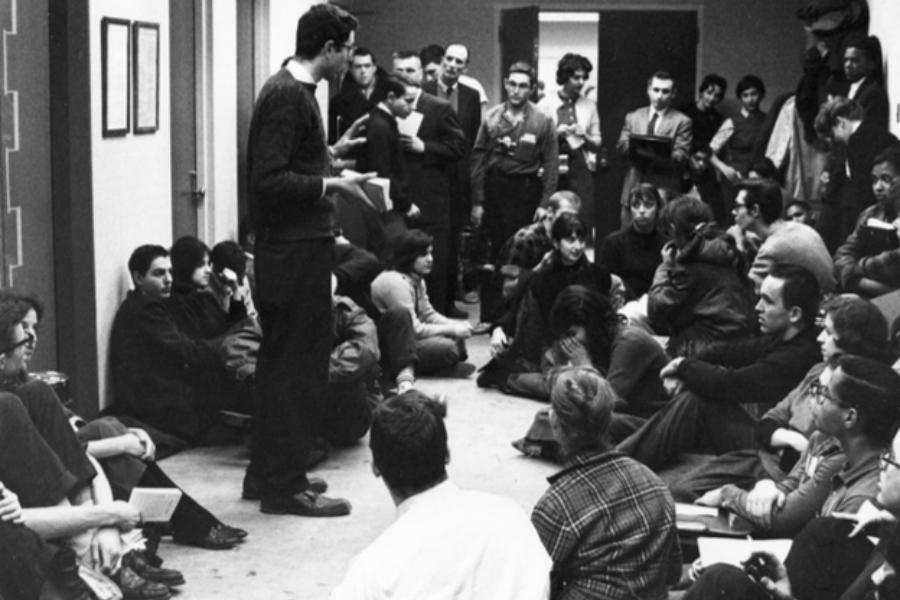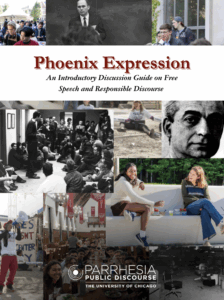Practicing Parrhesia: Free Expression & Deliberation at the University of Chicago

The University of Chicago has long been known for its commitment to free expression and open inquiry. The Parrhesia Public Thought and Discourse Program is carrying forward this tradition among students in the UChicago College and equipping undergraduates to engage in candid, responsible dialogue across differences.
As Dr. Ekaterina Lukianova, Associate Director of the program, explained, “Parrhesia is a word that describes the actual practice of speaking frankly and openly in a public context… our name emphasizes that we are about practice, putting principles into practice.”
Founded in 2018, Parrhesia is an interdisciplinary initiative created to serve the College. It was launched at a moment when universities everywhere were grappling with polarization, online echo chambers, and questions of how freedom of expression should be lived in practice.
Lukianova shared: “We have seminar discussions, but these academic discussions, highly abstract and intellectual, don’t always translate easily into healthier civic discourse… how do you promote this, and how do you meet new challenges? That’s why the University created initiatives like Parrhesia.”
A Deliberative Orientation
One of the program’s most ambitious efforts has been bringing deliberation directly into the student orientation experience. In August of 2025, more than two-thirds of the incoming class participated in small-group, peer-led deliberations about free expression before arriving on campus.
“If you want [students] to practice free inquiry and expression, you don’t want to just pass on abstract commitments to them. You really want them to be able to inquire into those commitments and challenge them,” Lukianova reflected. “Having deliberative discussions about [freedom of expression] was just a very natural step. We hope it gave them a spark for continuing these kinds of conversations throughout their college career.”
The sessions were guided by the Free Expression Discussion Guide, developed by a team of undergraduates under Lukianova’s supervision. The guide introduces three perspectives—We Can Work It Out, Protect the Critics, and Respect Differences and Give Space—each grounded in real UChicago history and cases.
Student facilitators played a key role in the orientation dialogues. According to Lukianova, many found the experience deeply rewarding: “They derived a lot of satisfaction from helping the incoming students to become part of the [College] community.”
At the same time, facilitators grew in their own skills. “Through this experience, many peer facilitators learned how important it is to create opportunities for people open up, before you get to helping deepen the discussion,” she noted. Yet challenges emerged as well, particularly around groupthink: “[Many peer facilitators observed that often] somebody would say something, and then the whole group goes that way… the pressure of wanting to fit in was very strong at this stage.”
Insights and Future Directions
As Parrhesia looks to the future of its orientation programming, they are planning to refine the guide, expand moderator training, and explore opportunities for broader collaboration. Lukianova expressed the hope that this work might connect with efforts at other campuses.
Her advice to others hoping to start similar initiatives is to begin with context. “First, what’s your context? We went for specific cases that happened here at UChicago and asked students to unpack those cases and the tensions in them. This – we hope – would help them tie broader concerns about freedom of expression on campus to the very specific context of UChicago.”
Parrhesia’s orientation dialogues embody the university’s values by grounding students in a tradition of free inquiry while preparing them to face today’s challenges. As Lukianova put it, “It’s about finding a way to live your commitment.”
For the National Issues Forums Institute, this work demonstrates the power of deliberation to help students—and communities—talk, decide, and act together for the public good.
You can learn more about the Parrhesia Public Thought and Discourse Program at parrhesia.uchicago.edu. If you’re interested in learning more about how to frame a deliberative discussion guide for your campus or community context, reach out to the NIFI team today.


